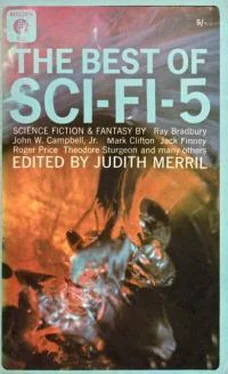The Best of Sci-Fi-5
Здесь есть возможность читать онлайн «The Best of Sci-Fi-5» весь текст электронной книги совершенно бесплатно (целиком полную версию без сокращений). В некоторых случаях можно слушать аудио, скачать через торрент в формате fb2 и присутствует краткое содержание. Год выпуска: 1966, Издательство: Mayflower-Dell, Жанр: Фантастика и фэнтези, на английском языке. Описание произведения, (предисловие) а так же отзывы посетителей доступны на портале библиотеки ЛибКат.
- Название:The Best of Sci-Fi-5
- Автор:
- Издательство:Mayflower-Dell
- Жанр:
- Год:1966
- ISBN:нет данных
- Рейтинг книги:3 / 5. Голосов: 1
-
Избранное:Добавить в избранное
- Отзывы:
-
Ваша оценка:
- 60
- 1
- 2
- 3
- 4
- 5
The Best of Sci-Fi-5: краткое содержание, описание и аннотация
Предлагаем к чтению аннотацию, описание, краткое содержание или предисловие (зависит от того, что написал сам автор книги «The Best of Sci-Fi-5»). Если вы не нашли необходимую информацию о книге — напишите в комментариях, мы постараемся отыскать её.
The Best of Sci-Fi-5 — читать онлайн бесплатно полную книгу (весь текст) целиком
Ниже представлен текст книги, разбитый по страницам. Система сохранения места последней прочитанной страницы, позволяет с удобством читать онлайн бесплатно книгу «The Best of Sci-Fi-5», без необходимости каждый раз заново искать на чём Вы остановились. Поставьте закладку, и сможете в любой момент перейти на страницу, на которой закончили чтение.
Интервал:
Закладка:
Why she should torment herself was difficult to understand, but at least the nightmare kept Madame Gioconda just this side of sanity and Mangon, who revered and loved Madame Gioconda, would have been the last person in the world to disillusion her. Each evening, when he finished his calls for the day, he would drive his sound truck all the way over from the West Side to the abandoned radio station under the flyover at the deserted end of F Street, go through the pretense of sweeping Madame Gioconda’s apartment on the stage of studio 2, charging no fee, make tea and listen to her reminiscences and plans for revenge, then see her asleep and tiptoe out, a wry but pleased smile on his youthful face.
He had been calling on Madame Gioconda for nearly a year, but what his precise role was in relation to her he had not yet decided. Oddly enough, although he was more or less indispensable now to the effective operation of her fantasy world, she showed little personal interest or affection for Mangon; but he assumed that this indifference was merely part of the autocratic personality of a world-famous prima donna, particularly one very conscious of the tradition, now alas meaningless, Melba—Callas—Gioconda. To serve at all was the privilege. In time, perhaps, Madame Gioconda might accord him some sign of favor.
Without him, certainly, her prognosis would have been poor. Lately the headaches had become more menacing, as she insisted that the applause was growing stormier, the boos and catcalls more vicious. Whatever the psychic mechanism generating the fantasy system, Mangon realized that ultimately she would need him at the studio all day, holding back the enveloping tides of nightmare and insanity with dummy passes of the sonovac. Then, perhaps, when the dream crumbled, he would regret having helped her to delude herself. With luck though she might achieve her ambition of making a comeback. She had told him something of her scheme—a serpentine mixture of blackmail and bribery—and privately Mangon hoped to launch a plot of his own to return her to popularity. By now she had unfortunately reached the point where success alone could save her from disaster.
She was sitting up when he returned, propped back on an enormous gold lame cushion, the single lamp at the foot of the couch throwing a semicircle of light onto the great flats which divided the sound stage from the auditorium. These were all from her last operatic role— The Medium —and represented a complete interior of the old spiritualist’s séance chamber, the one coherent feature in Madame Gioconda’s present existence. Surrounded by fragments from a dozen roles, even Madame Gioconda herself, Mangon reflected, seemed compounded of several separate identities. A tall regal figure, with full shapely shoulders and massive ribcage, she had a large handsome face topped by a magnificent coiffure of rich blue-black hair—the exact prototype of the classical diva. She must have been almost fifty, yet her soft creamy complexion and small features were those of a child. The eyes, however, belied her. Large and watchful, slashed with mascara, they regarded the world around her balefully, narrowing even as Mangon approached. Her teeth too were bad, stained by tobacco and cheap cocaine. When she was roused, and her full violet lips curled with rage revealing the blackened hulks of her dentures and the acid flickering tongue, her mouth looked like a very vent of hell. Altogether she was a formidable woman.
As Mangon brought her tea she heaved herself up and made room for him by her feet among the debris of beads, loose diary pages, horoscopes and jeweled address books that littered the couch. Mangon sat down, surreptitiously noting the time (his first calls were at 9:30 the next morning and loss of sleep deadened his acute hearing), and prepared himself to listen to her for half an hour.
Suddenly she flinched, shrank back into the cushion and gestured agitatedly in the direction of the darkened bandstand.
“They’re still clapping!” she shrieked. “For God’s sake sweep them away, they’re driving me insane. Oooohh …” she rasped theatrically, “over there, quickly … !”
Mangon leapt to his feet. He hurried over to the bandstand and carefully focused his ears on the tiers of seats and plywood music stands. They were all immaculately clean, well below the threshold at which embedded sounds began to radiate detectable echoes. He turned to the corner walls and ceiling. Listening very carefully he could just hear seven muted pads, the dull echoes of his footsteps across the floor. They faded and vanished, followed by a low threshing noise like blurred radio static—in fact Madame Gioconda’s present tantrum. Mangon could almost distinguish the individual words, but repetition muffled them.
Madame Gioconda was still writhing about on the couch, evidently not to be easily placated, so Mangon climbed down off the stage and made his way through the auditorium to where he had left his sonovac by the door. The power lead was outside in the truck but he was sure Madame Gioconda would fail to notice.
For five minutes he worked away industriously, pretending to sweep the bandstand again, then put down the sonovac and returned to the couch.
Madame Gioconda emerged from the cushion, sounded the air carefully with two or three slow turns of the head, and smiled at him.
“Thank you, Mangon,” she said silkily, her eyes watching him thoughtfully. “You’ve saved me again from my assassins. They’ve become so cunning recently, they can even hide from you.”
Mangon smiled ruefully to himself at this last remark. So he had been a little too perfunctory earlier on; Madame Gioconda was keeping him up to the mark.
However, she seemed genuinely grateful. “Mangon, my dear,” she reflected as she remade her face in the mirror of an enormous compact, painting on magnificent green eyes like a cobra’s, “what would I do without you? How can I ever repay you for looking after me?”
The questions, whatever their sinister undertones (had he detected them, Mangon would have been deeply shocked) were purely rhetorical, and all their conversations for that matter entirely one-sided. For Mangon was a mute. From the age of three, when his mother had savagely punched him in the throat to stop him crying, he had been stone dumb, his vocal cords irreparably damaged. In all their endless exchanges of midnight confidences, Mangon had contributed not a single spoken word.
His muteness, naturally, was part of the attraction he felt for Madame Gioconda. Both of them in a sense had lost their voices, he to a cruel mother, she to a fickle and unfaithful public. This bound them together, gave them a shared sense of life’s injustice, though Mangon, like all innocents, viewed his misfortune without rancor. Both, too, were social outcasts. Rescued from his degenerate parents when he was four, Mangon had been brought up in a succession of state institutions, a solitary wounded child. His one talent had been his remarkable auditory powers, and at fourteen he was apprenticed to the Metropolitan Sonic Disposal Service. Regarded as little better than garbage collectors, the sound-sweeps were an outcast group of illiterates, mutes (the city authorities preferred these—their discretion could be relied upon) and social cripples who lived in a chain of isolated shacks on the edge of an old explosives plant in the sand dunes to the north of the city which served as the sonic dump.
Mangon had made no friends among the sound-sweeps, and Madame Gioconda was the first person in his life with whom he had been intimately involved. Apart from the pleasure of being able to help her, a considerable factor in Mangon’s devotion was that until her decline she had represented (as to all mutes) the most painful possible reminder of his own voiceless condition, and that now he could at last come to terms with years of unconscious resentment.
Читать дальшеИнтервал:
Закладка:
Похожие книги на «The Best of Sci-Fi-5»
Представляем Вашему вниманию похожие книги на «The Best of Sci-Fi-5» списком для выбора. Мы отобрали схожую по названию и смыслу литературу в надежде предоставить читателям больше вариантов отыскать новые, интересные, ещё непрочитанные произведения.
Обсуждение, отзывы о книге «The Best of Sci-Fi-5» и просто собственные мнения читателей. Оставьте ваши комментарии, напишите, что Вы думаете о произведении, его смысле или главных героях. Укажите что конкретно понравилось, а что нет, и почему Вы так считаете.












